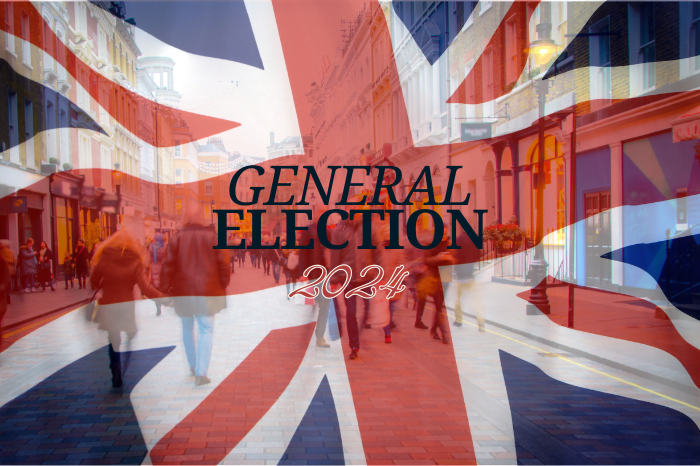Election 2024: Potential impacts on the UK retail market
Prime Minister Rishi Sunak has announced a general election to be held on 4th July, a move that could significantly impact the retail market in the UK.
As the election date approaches, the promises and plans set forth by the major political parties are under scrutiny, particularly regarding their implications for high street retailers and the broader economic landscape.
Labour Party’s five-point plan for revitalising the high street
In April, the Labour Party unveiled a five-point plan aimed at reviving the UK high street, focusing on reforming business rates and introducing tougher laws on shoplifting.
The key elements of their plan include:
1) Tackling anti-social behaviour and shoplifting: Labour proposes to increase police presence by adding 13,000 officers to tackle rising crime rates, including shoplifting. This measure is expected to make high streets safer for shoppers and business owners alike.
2) Rolling out banking hubs: To support local businesses, Labour plans to establish banking hubs, ensuring that face-to-face banking services remain available in every community.
3) Replacing business rates: The party intends to introduce a new system of business property taxation to create a more level playing field between physical stores and online retailers. This move aims to alleviate the financial burden on high street shops.
4) Stamping out late payments: Labour promises to implement stricter laws to ensure timely payments to small and independent retailers, thereby improving their cash flow and financial stability.
5) Revamping empty shops, pubs, and community spaces: The party will empower communities with the right to buy and redevelop vacant properties, aiming to rejuvenate local high streets and prevent urban decay.
Shadow Chancellor Rachel Reeves has emphasised Labour’s commitment to revitalising high streets, stating, “Labour will breathe new life into our high streets. We’ll create the conditions to get retailers thriving again by replacing business rates, opening hundreds of banking hubs across the country and stamping out late payments to get them paid on time.”
Conservative Party’s approach to high streets and small businesses
Jacob Young, Conservative MP for Redcar, has also highlighted the importance of supporting high streets. Young’s initiatives focus on tackling redundant buildings and promoting local businesses. In his statement on 14th May, Young announced the findings of the High Street Rental Auction consultation, a new power under the Levelling Up and Regeneration Act 2023. This initiative aims to reduce vacancy rates by allowing local authorities to require landlords to let empty high street shops through auctions, securing rental leases of up to five years.
Economic and market reactions
The announcement of the general election has led to a mixed reaction in the financial markets. According to Reuters, the election date has removed some uncertainty, allowing investors to focus on the economic outlook and interest rates. Despite a recent drop in inflation, the retail market remains cautious. Investors anticipate that Labour, leading the polls, may introduce policies favouring economic growth and market stability.
Impact of the general election on the UK retail market
The election introduces a significant variable into the UK retail market. Here’s how it might impact the sector:
Business taxation and rates
Labour’s proposals: Labour’s pledge to replace business rates with a new system of business property taxation aims to alleviate the financial burden on physical retailers. This could lead to reduced operational costs for high street stores, potentially allowing them to invest in their businesses and offer competitive pricing.
Conservatives’ approach: The Conservatives have focused less on overhauling business rates but have introduced measures like High Street Rental Auctions to reduce vacancy rates. Stability in business rates under their leadership could maintain the status quo but might not provide immediate financial relief to struggling retailers.
Crime and security
Labour’s measures: By proposing to increase the number of police officers and implement tougher laws on shoplifting, Labour aims to create safer shopping environments. This could increase foot traffic and consumer confidence in high streets, directly benefiting retail sales.
Current Conservative policies: The existing government’s approach has seen rising crime rates, impacting retailer security. A continuation of current policies without significant changes might prolong these challenges for retailers.
Consumer confidence and spending power
Economic growth and stability: A stable economic environment, as highlighted by Labour’s focus on economic growth and industrial strategy, could boost consumer confidence. Increased consumer confidence generally translates to higher spending, benefiting retail sales. Market reactions: The financial markets have reacted cautiously but positively to the election news, with slight improvements in the pound and stock futures. A Labour victory, perceived to bring economic stability and growth, could further bolster market confidence.
Employment and workers’ rights
Labour’s employment policies: Labour’s proposals for higher wages, inclusive ownership funds, and improved workers’ rights could increase disposable income for many workers. This might lead to increased spending in retail. However, higher employment costs could strain retailers, particularly small businesses, potentially leading to higher prices for consumers.
Conservatives’ focus: The Conservatives’ more conservative approach to employment law changes means fewer immediate costs for businesses but might not provide the same boost to consumer spending power.
High street revitalisation
Labour’s revitalisation plan: Labour’s comprehensive plan to revamp empty shops, introduce banking hubs, and support local businesses could rejuvenate high streets. Improved high streets can attract more visitors, increasing retail sales and the overall vibrancy of local economies.
Conservative initiatives: Conservative initiatives like the High Street Rental Auctions aim to reduce vacancies and rejuvenate high streets. If successful, this could also lead to increased footfall and retail sales.
Investor sentiment and market stability
Short-term volatility: Elections inherently bring short-term volatility as markets react to the uncertainty. Retailers might experience fluctuations in stock prices and consumer spending leading up to the election.Long-term prospects: The long-term impact will depend on the election outcome. A Labour victory, with its focus on high street support and economic growth, might reassure investors of a stable retail environment.Conversely,
Conservative policies may be seen as maintaining current market conditions, which might not address the immediate concerns of high street retailers.
Industry perspectives
Retail industry stakeholders have expressed varied reactions to the election announcement and party manifestos. Usdaw, the retail trade union, has voiced strong support for Labour, citing the need for a new deal for workers and action on retail crime. General Secretary Paddy Lillis stated, “We are urging our members to vote Labour for a new deal for workers, action on retail crime, and support for struggling high streets.”
Seb James, CEO of Boots, has endorsed Labour’s focus on the high street, highlighting the importance of government collaboration with businesses to foster economic growth and employment. James stressed the need for a stable economy and long-term industrial strategy to support high street retailers.
The upcoming general election presents a critical juncture for the UK retail market. Labour’s policies could bring substantial changes aimed at revitalising high streets and supporting local businesses, while the Conservatives focus on stability and gradual improvement. Retailers and investors will be closely monitoring the election outcomes and subsequent policy implementations to adapt their strategies and maximise opportunities in a potentially shifting economic landscape.














